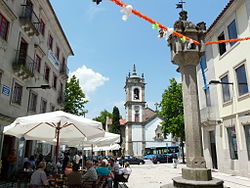Vila Real, Portugal
| Vila Real | ||
|---|---|---|
| Municipality | ||

Square
|
||
|
||
 |
||
| Coordinates: 41°17′45″N 07°44′46″W / 41.29583°N 7.74611°WCoordinates: 41°17′45″N 07°44′46″W / 41.29583°N 7.74611°W | ||
| Country |
|
|
| Region | Norte | |
| Subregion | Douro | |
| Intermunic. comm. | Douro | |
| District | Vila Real | |
| Government | ||
| • President | Rui Santos (PS) | |
| Elevation | 450 m (1,480 ft) | |
| Population (2011) | ||
| • Total | 51,850 | |
| Time zone | WET/WEST (UTC+0/+1) | |
| Postal code | 5000 | |
| Area code | 259 | |
Vila Real is a municipality and simultaneously the capital and largest city of the Vila Real District, northern Portugal. The population in 2011 was 51,850, in an area of 378.80 square kilometres (146.26 sq mi). As of 2001[update] the city proper had a population of 24,481.
Vila Real is ranked seventh in the list of Portugal's most livable cities in the survey of living conditions published by the Portuguese newspaper Expresso in 2007.
The region shows traces of inhabitation during the paleolithic era, while the settlement of Panóias had a Roman presence. Vila Real itself was founded in 1289 by King Denis of Portugal, hence its name meaning Royal Town. It housed more members of the royal family during the Middle Ages than any other settlement in Portugal except the capital in Lisbon, and family Coats of Arms remain above old houses, some of which still occupied by those families. Vineyards were introduced to the municipality in 1764, growing red, white and rosé wines for export. Despite its royal presence, Vila Real only gained city status under the Portuguese Republic in 1925.
The coat of arms of Vila Real - a sword embedded in a wreath of zambujeiro (wild olive tree) and the slogan Aleu - is derived from the decorative motif of the tomb of Pedro de Menezes, 1st Count of Vila Real, found in the Igreja da Graça in Santarém. 'Aleu' or 'aleo' is an old Portuguese term for a 'gaming stick' (as used in hockey or shuffleboard). It refers to a famous episode concerning Pedro de Menezes from shortly after 1415. Pedro de Menezes was engaged in an outdoor game in the king's presence when a messenger arrived reporting an imminent Moroccan attack on Portuguese-held Ceuta. Menezes is said to have raised his gaming stick (aleo) and told the king that "with that stick alone" he could defend Ceuta from all the power of Morocco.
...
Wikipedia

